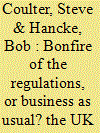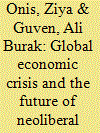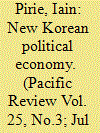| Srl | Item |
| 1 |
ID:
145552


|
|
|
|
|
| Summary/Abstract |
Employment and labour market regulation initially appeared as one of the solid red lines in the UK's renegotiation of the country's place in the EU. The basic argument is that the UK's more deregulated labour market would sit uneasily in the more organised models, based on statutory instruments or collective bargaining, found on the continent. While there is a legitimate problem here, EU employment regulations appear manageable from the point of view of business, while unions see them as important tools for socially responsible economic restructuring. Most of UK employment case law is now deeply entangled with EU law; labour market regulations have, on the whole, become part of the way of doing business in the Single Market; and a simple cost–benefit analysis appears impossible because some costs are not quantifiable and the costs of others are reduced when taken as a bundle. Labour unions agree that transposition of European law needs to be done taking into account local sensitivities, while internationally oriented companies do not see EU regulations on the whole as detrimental to business. Importantly, though, the costs and benefits of EU employment regulations are not symmetrically distributed across different companies: large companies are better able to reap the rewards and accommodate the costs of operating in the Single Market than smaller companies.
|
|
|
|
|
|
|
|
|
|
|
|
|
|
|
|
| 2 |
ID:
108961


|
|
|
|
|
| Publication |
2011.
|
| Summary/Abstract |
This article outlines the main elements of rupture and continuity in the global political economy since the global economic crisis of 2008-2009. While the current calamity poses a more systemic challenge to neoliberal globalization than genetically similar turbulences in the semi-periphery during the 1990s, we find that evidence for its transformative significance remains mixed. Efforts to reform the distressed capitalist models in the North encounter severe resistance, and the broadened multilateralism of the Group of 20 is yet to provide effective global economic governance. Overall, neoliberal globalization looks set to survive, but in a more heterodox and multipolar fashion. Without tighter coordination between old and emerging powers, this new synthesis is unlikely to inspire lasting solutions to pressing global problems such as an unsustainable international financial architecture and the pending environmental catastrophe and may even fail to preserve some modest democratic and developmental gains of the recent past.
|
|
|
|
|
|
|
|
|
|
|
|
|
|
|
|
| 3 |
ID:
113721


|
|
|
|
|
| Publication |
2012.
|
| Summary/Abstract |
A key theme within the literature on the evolution of the Korean political economy since the 1997/8 crisis has been the extent to which Korea remains a 'developmental state' or has pursued radical neoliberal reform. These debates have not only reflected a concern with understanding the Korean economy but with a wider set of questions relating to the future of capitalist diversity within a globalized economy. By the late 1980s Korea had come to be regarded as a model of successful state-led late capitalist development. Korean modern economic history has insured that questions relating to the extent that it has pursued neoliberal reform have been of keen interest to students of political economy globally. This paper argues that substantive neoliberal reform has taken place in Korea since 1997. The thesis that a new 'developmental state' is in process of consolidating itself is simply wrong. However, the state's reform program interacted with material conditions and political coalitions at the meso level in a complex and uneven manner. In certain critical sectors, such as finance, a neoliberal regulatory regime has been consolidated. In others, such as telecommunications, developmentalist regulatory structures have proven to be highly resilient. In order to fully understand the complexity of the contemporary Korean political economy it is necessary, therefore, to prioritize the importance of meso-level analysis.
|
|
|
|
|
|
|
|
|
|
|
|
|
|
|
|